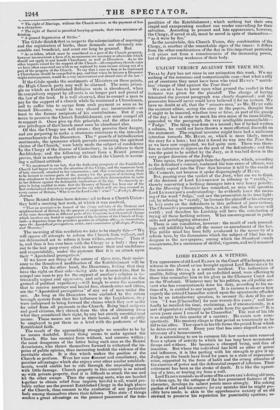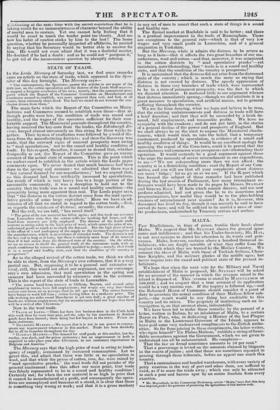LORD ELDON AS A WITNESS.
THE appearance of old Lord ELDON in the Court of Exchequer, as a witness in the absurd cc:ion brought against Lord BROUGHAM by the notorious DICAS, is a notable incident. The indications of senility, failing strength and an enfeebled mind, were affecting to those who remember him in his glory in the Chancery Court and on the Woolsack. Whatever may be his politics, an old public ser- vant who has conscientiously done his duty, according to his no- tions of it, is entitled to our respect. It is curious to observe how eagerly the retired Chancellor seized upon the opportunity afforded him by an introductory question, to recount the date of his ser- vice. " I was [Chancellor] for near twenty-five years ;" and how fondly he recalled the time, exclaiming, as if unconsciously, in a sort of ejaculatory soliloquy quite aside from the question—" It is seven years since I ceased to be Chancellor." The rest of his life is as nought to this quarter of a century. He exists now retro- spectively. His memory clings to that period as tenaciously as he did to his office. That epoch in his life forms the period from' which he dates every event. Every year that has since elapsed is an niversary of a bereavement. It is astonishing to see in common life how soonanian removed from a sphere of activity to which he has long been accustomed droops and withers. He becomes a changed being, and dies of inanition. But where the individual has held an office of power and influence, it is like parting with his strength to give it up. Judges on the bench have lived for years in a state of superannu- ation, supported by the force of habit and the strong stimulus of the exercise of power and the deferential respect of inferiors. Their retirement has been as the stroke of death. It is like the uproot- ing of a tree, or tearing ivy from a wall.
Lord ELDON reminds us of some of SHAKSPEARE'S doting old men, in whom age, by the collapse of the less prominent features of the character, develops its salient points more strongly. His asking pardon of God and his country for any mistake that lie might pos- sibly have made, is akin to the apprehensive anxiety of an old steward to preserve his reputation for punctuality spotless; so-
isisticatine at the same time with the secret conviction that he is taking credit for an immaculateness of character beyond the ability of mortal men to sustain. Yet one cannot help feeling that it would be cruel to touch the tender point too closely. And see how his habit of caution sticks by him to the last ! The home question, whether he personally inspected all affidavits, he parried by saying that his Secretary would be better able to answer for him. He would not even admit that it was a doubtful matter. He doubted if he had a doubt : and as he could not " postpone it," he got rid of the inconvenient question by abruptly retiring.

















 Previous page
Previous page